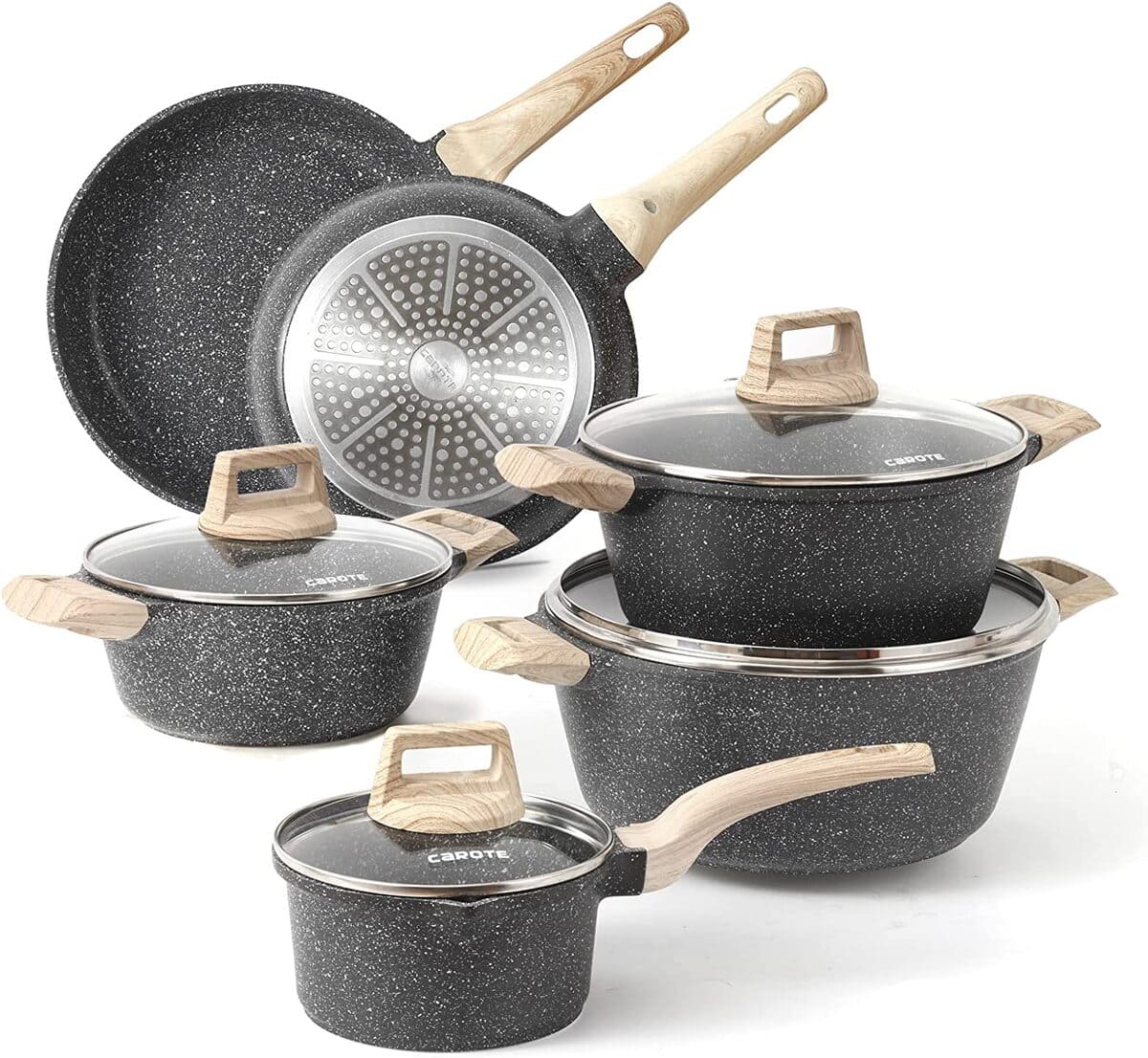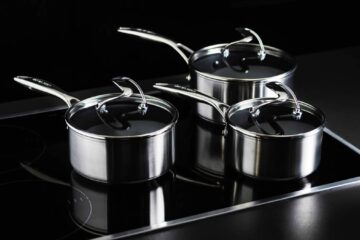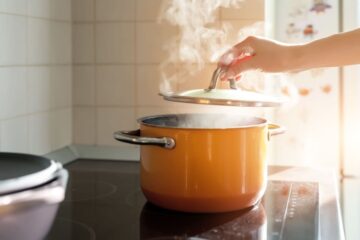Granite cookware is becoming increasingly popular among home cooks and professional chefs alike. This type of cookware is known for its durability, non-stick properties, and attractive appearance. However, like any type of cookware, there are pros and cons to using granite cookware.
One of the main advantages of granite cookware is its non-stick properties. Unlike traditional non-stick cookware, granite cookware is free of PTFE and PFOA, which are potentially harmful chemicals. The porcelain coating on granite cookware is also non-reactive with acidic foods, making it a safe option for cooking a wide variety of dishes. Additionally, granite cookware is known for its durability and resistance to scratching, warping, and other forms of damage.
What is Granite Cookware?
Granite cookware is a type of cookware made from a combination of carbon steel or aluminum and enamelware that has a layer of porcelain. This composition makes the cookware durable and resistant to scratches, warping, and other forms of damage. Granite cookware is also available in various colors and designs, making it an attractive option for home cooks and professional chefs alike.
One of the main advantages of granite cookware is its safe nonstick coating, which is free of PTFE, PFOA, APEO, Lead, and Cadmium. This coating makes it a valuable choice for everyday cooking, as it won’t react with acidic foods and remains inert throughout its stay in your kitchen. Additionally, granite cookware is easy to clean due to its nonstick surface.
Another benefit of granite cookware is its ability to work well with acidic foods. Unlike some other types of cookware, granite cookware hardly leaches into your food, ensuring that your meals remain safe and healthy. Moreover, granite cookware lasts longer than ceramic cookware, which might get cracks over time.
Pros of Granite Cookware
Granite cookware is becoming increasingly popular due to its durability, non-stick surface, ease of cleaning, and heat distribution. In this section, we will explore the advantages of using granite cookware.
Durability
Granite is a hard and durable material that can withstand high temperatures and regular usage. Granite cookware is resistant to scratches, warping, and other forms of damage, which means it can last for many years with proper care. It is also less likely to chip or crack compared to other types of cookware.
Non-Stick Surface
Granite cookware has a non-stick surface that allows for healthy cooking without the use of oil or butter. This makes it an ideal choice for those who are health-conscious or watching their weight. The non-stick surface also makes it easier to cook delicate foods, such as fish, without them sticking to the pan.
Easy to Clean
Granite cookware is easy to clean and maintain. The non-stick surface means that food does not stick to the pan, making it easy to wipe clean with a sponge or cloth. Additionally, granite cookware is dishwasher safe, which makes cleaning up even easier.
Heat Distribution
Granite cookware is known for its excellent heat distribution. It heats up quickly and evenly, which means that food cooks evenly without any hot spots. This makes it an ideal choice for cooking a wide range of foods, from pancakes to stir-fries.
Cons of Granite Cookware
When considering purchasing granite cookware, it is important to be aware of the potential drawbacks. Here are some cons to keep in mind:
Price
Granite cookware can be expensive compared to other types of cookware such as stainless steel or aluminum. The cost is due to the high-quality materials and construction used to make the cookware. However, it is important to note that the initial investment can pay off in the long run as granite cookware is durable and can last for many years.
Weight
Granite cookware can be heavy and difficult to handle, especially larger pieces like frying pans or saucepans. This may make it challenging for some individuals to use, especially those with limited hand strength or mobility issues.
Not Suitable for High Heat Cooking
While granite cookware is generally safe to use at high temperatures, it is not recommended to use it when the temperature is above 500 degrees Fahrenheit. This is because the non-stick coating can start to break down and release harmful chemicals into the food. This can be a concern for those who like to cook at high temperatures or use their cookware for grilling or broiling.
Not Dishwasher Safe
Granite cookware is not dishwasher safe and must be washed by hand. This can be a hassle for those who prefer the convenience of using a dishwasher. Additionally, using abrasive sponges or harsh cleaning agents can damage the non-stick coating, reducing the lifespan of the cookware.
How to Choose the Best Granite Cookware?
When it comes to choosing the best granite cookware, there are a few factors to consider. Here are some things to keep in mind:
Material Quality
The quality of the material used in the construction of granite cookware is essential. Look for cookware that is made of high-quality materials such as carbon steel or aluminum. These materials are good conductors of heat, ensuring that your food cooks evenly. Also, check the thickness of the cookware. Thicker cookware is more durable and less likely to warp or scratch.
Brand Reputation
Brand reputation is another crucial factor to consider when choosing granite cookware. Look for brands that have a good reputation for producing high-quality cookware. You can research online or ask for recommendations from friends and family who have experience with granite cookware.
Price
Granite cookware comes in a range of prices, so it’s essential to consider your budget. Keep in mind that higher-priced cookware may be more durable and have better features, but it’s not always the case. Look for cookware that offers good value for money.
Cooking Needs
Consider your cooking needs when choosing granite cookware. Do you need a set that includes different sizes and types of cookware, or do you only need a few essential pieces? Also, consider the type of cooktop you have. Not all granite cookware is compatible with all cooktops, so make sure to check before purchasing.
Conclusion
In conclusion, granite cookware has both pros and cons that should be considered before making a purchase. The durability of granite cookware is one of its biggest advantages, as it can last for many years with proper care. Additionally, granite cookware is generally considered safe to use, as it is non-reactive and does not contain harmful chemicals.
However, there are also some disadvantages to using granite cookware. The nonstick surface can chip and crack over time, especially if sharp utensils are used or if it is exposed to extremely high cooking temperatures. Additionally, granite cookware is not oven-safe, which can limit its versatility in the kitchen.
When deciding whether or not to purchase granite cookware, it is important to weigh the pros and cons and consider your specific cooking needs. If you prioritize durability and safety, then granite cookware may be a good choice for you. However, if you frequently use your cookware in the oven or prefer a nonstick surface that will last longer, then you may want to consider other options. Ultimately, the decision comes down to personal preference and cooking style.



